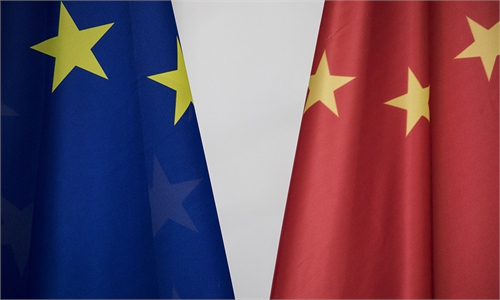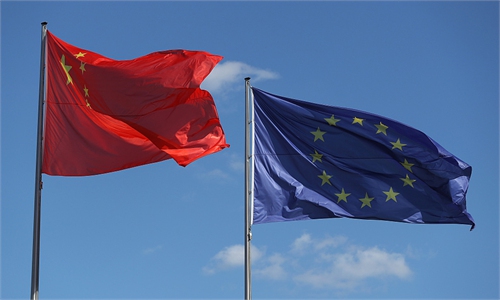COMMENTS / EXPERT ASSESSMENT
EU, China nearing a BIT pact, driving US to reflect on unilateralism

Illustration: Tang Tengfei/GT
As China, EU officials work overtime toward their set goal to concluding negotiations on China-EU Bilateral Investment Treaty before this year ends, recent events have shown a steady flow of encouraging news.
While the EU is reportedly to have agreed "in principle" to a draft deal, China's Foreign Ministry said on Tuesday that the negotiations have entered the "final stretch."
Against the backdrop of US protectionism and unilateralism, China and EU have held 10 rounds of negotiations on the comprehensive pact on bilateral investment since the beginning of this year despite the difficulties caused by the COVID-19 pandemic, making important progress in narrowing their differences.
As the negotiations have reached the final sprint and clearly accelerated, both sides have shown increased confidence in delivering a diplomatic breakthrough before the New Year dawns.
The reason why the two sides have been able to overcome difficulties, bridge differences, and advance negotiations to this day is due to their common determination to promote economic cooperation and safeguard multilateralism and open markets. .
It must be pointed out that the negotiation was nothing but a process in which both sides display good will to compromise. Ideological differences between China and EU have existed for a long time, such as on human rights.
The progress China and EU have made in expanding economic and trade cooperation is closely related with EU countries' future growth and China's long-term modernization drive. From passing foreign investment law to reducing items in the negative list of market access, China makes continuous concrete efforts to deepen reform and improve its business environment.
China's Foreign Investment Law came into effect at the beginning of the year, marking a huge step forward to internationalization and legalization of China's investment environment. Last week, China has further narrowed its negative list of market access. All these efforts show China's sincerity in expanding foreign cooperation and its determination and confidence to continue to advance opening-up and to partner with EU.
Considering the Trump administration's tariffs war and tech crackdown, should China successfully conclude the investment pact with EU after signing the Regional Comprehensive Economic Partnership (RCEP), it will enable China to contribute more to economic development in Asia, and in Europe too. It will be a win-win deal.
The China-EU investment agreement is not targeted against any third party, and the "diplomatic implications" of the pact should not be overly interpreted.
In response to an American reporter's question asking possible "diplomatic implications" of the agreement on Tuesday, Chinese Foreign Ministry spokesperson Wang Wenbin said that for China and EU, economic cooperation is far greater than competition, and consensus is greater than difference. The two sides should work together to promote their comprehensive strategic partnership and contribute to the world's sustainable and peaceful development.
However, the investment agreement with EU is likely to produce some pressure on the US government, which has its own long list of disputes with EU in terms of trade and investment. During the Obama administration, Washington had tried to solve the problem through Transatlantic Trade and Investment Partnership (T-TIP) negotiations.
In addition to their economic rivalry, a key reason why EU and US couldn't sign the treaty is due to the different approach taken by the US government. The US always wants to take a predominant position in dealing with the difference with EU, which has been replaced by extreme unilateralism under Trump's governance.
The China-EU investment treaty and RCEP are expected to spur the incoming Biden administration to rectify Trump government's protectionism and unilateralism.
The Biden administration should reflect the current administration's decoupling and bullying approach in proceeding economic cooperation and trade issues with China and EU.
In the long run, China's refrom in opening up its economy and the China-EU investment pact will promote the development of global free trade. Stronger economy cooperation between China and EU will undoubtedly provide an impetus for the global economy.
The author is director of the Department of European Studies, China Institute of International Studies. bizopinion@globaltimes.com.cn



